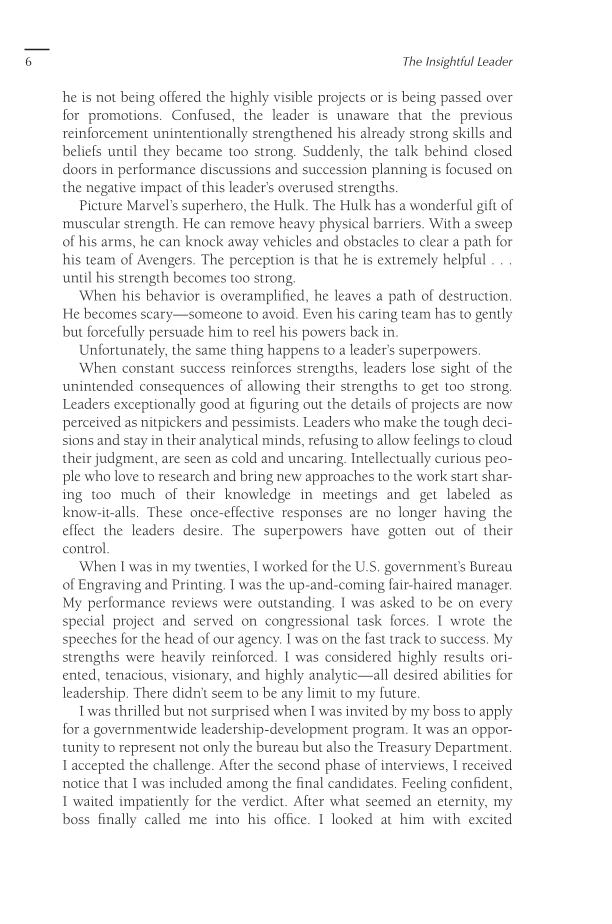6 The Insightful Leader he is not being offered the highly visible projects or is being passed over for promotions. Confused, the leader is unaware that the previous reinforcement unintentionally strengthened his already strong skills and beliefs until they became too strong. Suddenly, the talk behind closed doors in performance discussions and succession planning is focused on the negative impact of this leader’s overused strengths. Picture Marvel’s superhero, the Hulk. The Hulk has a wonderful gift of muscular strength. He can remove heavy physical barriers. With a sweep of his arms, he can knock away vehicles and obstacles to clear a path for his team of Avengers. The perception is that he is extremely helpful . . . until his strength becomes too strong. When his behavior is overamplified, he leaves a path of destruction. He becomes scary—someone to avoid. Even his caring team has to gently but forcefully persuade him to reel his powers back in. Unfortunately, the same thing happens to a leader’s superpowers. When constant success reinforces strengths, leaders lose sight of the unintended consequences of allowing their strengths to get too strong. Leaders exceptionally good at figuring out the details of projects are now perceived as nitpickers and pessimists. Leaders who make the tough deci- sions and stay in their analytical minds, refusing to allow feelings to cloud their judgment, are seen as cold and uncaring. Intellectually curious peo- ple who love to research and bring new approaches to the work start shar- ing too much of their knowledge in meetings and get labeled as know-it-alls. These once-effective responses are no longer having the effect the leaders desire. The superpowers have gotten out of their control. When I was in my twenties, I worked for the U.S. government’s Bureau of Engraving and Printing. I was the up-and-coming fair-haired manager. My performance reviews were outstanding. I was asked to be on every special project and served on congressional task forces. I wrote the speeches for the head of our agency. I was on the fast track to success. My strengths were heavily reinforced. I was considered highly results ori- ented, tenacious, visionary, and highly analytic—all desired abilities for leadership. There didn’t seem to be any limit to my future. I was thrilled but not surprised when I was invited by my boss to apply for a governmentwide leadership-development program. It was an oppor- tunity to represent not only the bureau but also the Treasury Department. I accepted the challenge. After the second phase of interviews, I received notice that I was included among the final candidates. Feeling confident, I waited impatiently for the verdict. After what seemed an eternity, my boss finally called me into his office. I looked at him with excited
Document Details My Account Print multiple pages
Print
You have printed 0 times in the last 24 hours.
Your print count will reset on at .
You may print 0 more time(s) before then.
You may print a maximum of 0 pages at a time.


















































































































































































